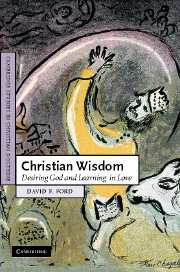Book contents
- Frontmatter
- Contents
- Acknowledgements
- Introduction: theology as wisdom
- 1 Wisdom cries
- 2 A wisdom interpretation of scripture
- 3 Job!
- 4 Job and post-Holocaust wisdom
- 5 Jesus, the Spirit and desire: wisdom christology
- 6 Learning to live in the Spirit: tradition and worship
- 7 Loving the God of wisdom
- 8 An inter-faith wisdom: scriptural reasoning between Jews, Christians and Muslims
- 9 An interdisciplinary wisdom: knowledge, formation and collegiality in the negotiable university
- 10 An interpersonal wisdom: L'Arche, learning disability and the Gospel of John
- Conclusion: love's wisdom
- Index of citations
- Subject index
5 - Jesus, the Spirit and desire: wisdom christology
Published online by Cambridge University Press: 22 September 2009
- Frontmatter
- Contents
- Acknowledgements
- Introduction: theology as wisdom
- 1 Wisdom cries
- 2 A wisdom interpretation of scripture
- 3 Job!
- 4 Job and post-Holocaust wisdom
- 5 Jesus, the Spirit and desire: wisdom christology
- 6 Learning to live in the Spirit: tradition and worship
- 7 Loving the God of wisdom
- 8 An inter-faith wisdom: scriptural reasoning between Jews, Christians and Muslims
- 9 An interdisciplinary wisdom: knowledge, formation and collegiality in the negotiable university
- 10 An interpersonal wisdom: L'Arche, learning disability and the Gospel of John
- Conclusion: love's wisdom
- Index of citations
- Subject index
Summary
Christian wisdom is shaped by and in relation to Jesus Christ. That has already begun to emerge in chapters 1 and 2 above. There the reading of Luke–Acts and the Prologue of the Gospel of John in search of Christian wisdom centred on Jesus Christ. He was seen as both teaching and living out a prophetic wisdom, ‘greater than Solomon’, ‘greater than Jonah’, rooted in the reciprocal knowing of himself and his Father. His wisdom was both a discerning of cries and an embodying of them, with his final loud cry from the cross as the central reference point for Christian wisdom. The convergence of Luke and John on key dimensions of this wisdom was explored: it is God-centred, has the whole of creation as its context, is immersed in history and the contemporary world, interprets the Old and New Testaments in relation to each other, and is constantly sought afresh with others in a community whose basic trust is that the Spirit will lead them into further truth. This requires as a core practice what was called a wisdom interpretation of scripture. That was expressed in terms of the hermeneutics of incarnation, crucifixion, resurrection and Pentecost, as ways of rereading in the light of key events that together identify Jesus Christ and his significance.
- Type
- Chapter
- Information
- Christian WisdomDesiring God and Learning in Love, pp. 153 - 191Publisher: Cambridge University PressPrint publication year: 2007

